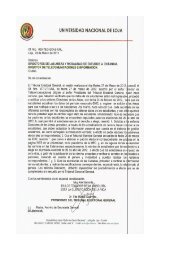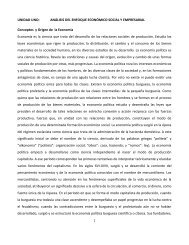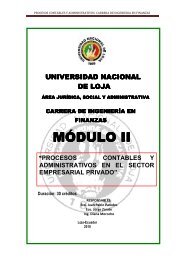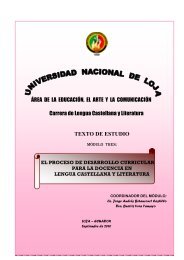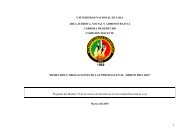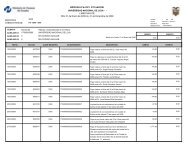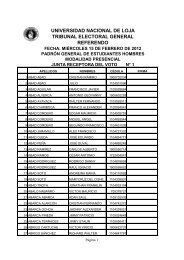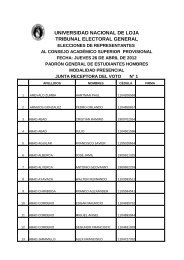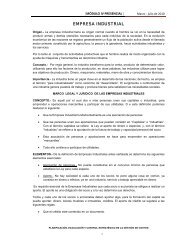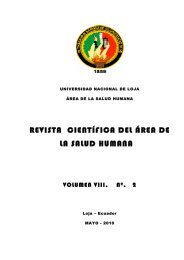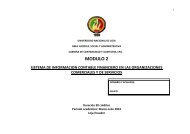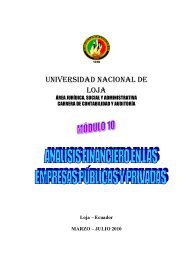module 5 planning of the english language teaching-learning process
module 5 planning of the english language teaching-learning process
module 5 planning of the english language teaching-learning process
Create successful ePaper yourself
Turn your PDF publications into a flip-book with our unique Google optimized e-Paper software.
UNIVERSIDAD NACIONAL DE LOJA<br />
Área de la Educación el Arte y la Comunicación<br />
English Language Career<br />
help us to identify possible procedures. But <strong>the</strong> most important thing is to make<br />
sure that <strong>the</strong> materials, tasks and activities we select are <strong>the</strong> ones that will help<br />
a particular group <strong>of</strong> learners to achieve <strong>the</strong> aim we have identified.<br />
A sequence <strong>of</strong> lessons is a number <strong>of</strong> related lessons that develop <strong>language</strong><br />
knowledge and/or <strong>language</strong> skills over a period <strong>of</strong> time. Sequences may<br />
develop a single topic or <strong>language</strong> area, or may involve topics or <strong>language</strong><br />
areas that are very closely connected. Here are three examples:<br />
Structural sequence Integrated skills<br />
sequence<br />
1 revision: past simple 1 vocabulary development:<br />
2 revision: present perfect describing places<br />
3 contrast: past simple vs. (function: describing)<br />
present perfect<br />
2 reading: choosing a<br />
holiday<br />
3 writing: letter to a friend<br />
narrating holiday<br />
experiences (function:<br />
narrating)<br />
Project work<br />
1 reading and listening<br />
about free time activities<br />
2 class survey and<br />
research: sport and<br />
entertainment<br />
3 preparation <strong>of</strong> a poster<br />
display to show results <strong>of</strong><br />
survey<br />
<br />
Key Concepts<br />
Planning an individual lesson<br />
When we plan an individual lesson, we have to ask ourselves a number <strong>of</strong><br />
questions:<br />
• Will <strong>the</strong> topic be interesting and motivating for my learners?<br />
• Are <strong>the</strong> activities and <strong>teaching</strong> materials at <strong>the</strong> right level for all <strong>the</strong> learners?<br />
• Have I planned enough for <strong>the</strong> time available? Do I need any extra material?<br />
• Have I planned too much for <strong>the</strong> time available? Are <strong>the</strong>re any stages I can<br />
cut if necessary?<br />
• Have I thought about exactly how to start and end <strong>the</strong> lesson?<br />
• Does each step in <strong>the</strong> lesson help to achieve <strong>the</strong> aim?<br />
Planning a sequence <strong>of</strong> lessons<br />
Look at <strong>the</strong>se three teachers' schemes <strong>of</strong> work (i.e. outline plans) for a<br />
sequence <strong>of</strong> four lessons. What do you think might be <strong>the</strong> advantages and<br />
disadvantages <strong>of</strong> each scheme?<br />
[Escribir texto] Página 55



